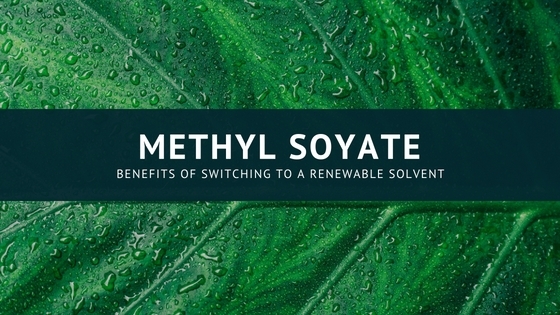[av_image src=’https://ecolink.com/wp-content/uploads/2018/08/Methyl-soyate-3-300×169.jpg’ attachment=’12802′ attachment_size=’medium’ align=’center’ styling=” hover=” link=” target=” caption=” font_size=” appearance=” overlay_opacity=’0.4′ overlay_color=’#000000′ overlay_text_color=’#ffffff’ copyright=” animation=’no-animation’ av_uid=’av-jkinno5d’ admin_preview_bg=”][/av_image]
[av_textblock size=” font_color=” color=” av-medium-font-size=” av-small-font-size=” av-mini-font-size=” av_uid=’av-jkinmxlx’ admin_preview_bg=”]
Methyl Soyate Properties
Soy Methyl Ester, or Methyl Soyate, is a soy-based derivative produced by transesterification of soy oil esters. Transesterification is the process of exchanging an organic group of an ester with an organic group of an alcohol; these reactions often involve an acid or base catalyst. Methyl Soyate includes the following properties:
- Low in VOC (Volatile Organic Compounds),
- High flashpoint,
- And Nontoxic
Along with the above properties, Methyl Soyate evaporates slowly which is prolongs the solvent action time and reduces the solvent usage. Furthermore, Methyl Soyate has gained more popularity as a carrier solvent alternative for MEK, Toluene, and Xylene in coating products, and as a replacement for MEK and MeCL in adhesives. Additionally, the previously mentioned chemicals are suspected carcinogens while Methyl Soyate has no evidence towards being a carcinogen.
Methyl Soyate Applications
Methyl Soyate includes a variety of applications that range from cosmetic/ personal uses to industrial applications. Due to Methyl Soyate’s slow evaporation time, this becomes an advantage with ink removal and paint stripping. Due to its cleaning properties, the solvent is appearing more in consumer products including hand sanitizers, skin lotions, nail polish removers, and automobile polishes. In an industrial setting, Methyl Soyate is an ideal solvent for industrial cleaning and degreasing. The product may also be used within paints and lacquers which raises the flashpoint and slows the overall drying time. Additionally, it is found within adhesive and anti-graffiti products for cleanup. Beyond Methyl Soyate’s cleaning applications, different forms may be used as renewable fuel for diesel engines.
Methyl Soyate Environmental Impact
Due to its low renewable and organic structure, Methyl Soyate is seen as a safer alternative both within the workplace and for the environment. Methyl Soyate is becoming the ideal replacement for petroleum and chlorinated products due to their harsh health and environmental impacts. Additionally, several petroleum-based products contain a higher VOC content which contributes to smog creation within the ozone while Methyl Soyate has a low VOC. The use of biofuels reduces the net CO2 by seventy-eight percent compared to the use of petroleum as a fuel. Since Methyl Soyate is an organic compound, that also makes it biodegradable which becomes ideal environmentally. The EPA placed a Methyl Soyate solvent on the National Contingency Plan product schedule for oil spills due to it being used to clean up and recover spilled petroleum products from shorelines.
For more information contact us at info@ecolink.com, or call us today at 800-563-1305.
[/av_textblock]















